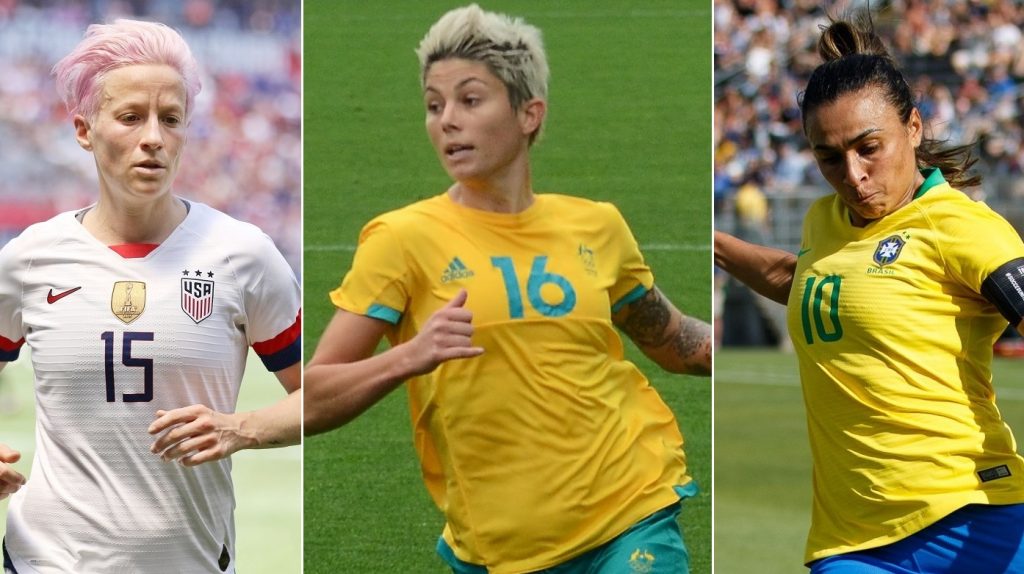Who are the queer icons in Women’s World Cup history? Listen to the FvH Podcast
Guests on the special ‘Pride and the Women’s World Cup’ episode of the Football v Homophobia Podcast discuss LGBTQ+ trailblazers from past tournaments – along with a couple of the controversies that emerged at Germany 2011; listen to the conversation and more talking points on the pod…

At the last FIFA Women’s World Cup, in France four years ago, there were at least 38 out LGBTQ+ players – more than twice the representation from Canada 2015.
In 2023, as reported by Outsports, that visibility for our community has more than doubled once again.
In both instances, the expansion of the tournament by eight teams is significant, but a greater factor even than that is the seismic shift in global LGBTQ+ rights in the last 12 years.
At Germany 2011, for example, only three of the competing nations had equal marriage legislation at a national level. That number for 2023 now stands at 20 nations.
This summer, at the time of writing, there are 91 publicly out players in squads who will be in action in Australia and New Zealand, with a targeted worldwide audience of two billion people.
However, with FIFA’s decision not to allow team captains to wear armbands in the traditional Pride rainbow colours or have ‘One Love’ written on them, there’s still a strong feeling that LGBTQ+ people are fighting not just to be seen but to have the opportunity to inspire others.
That’s why it’s right that we celebrate the pioneers who paved the way for today’s players to be out, should they wish to be.
On the latest episode of the Football v Homophobia Podcast – a special edition produced by Sports Media LGBT+ to mark its ongoing partnership with the Football Writers’ Association – a group of reporters who will be attending the 2023 tournament selected their trailblazers.
We also learned more about two controversies that occurred 12 years ago, the type of incidents that we all want to see consigned to the history books forever.
Here are some excerpts from the episode…
Júlia Belas on Sissi and Brazil’s ‘Holy Trinity’ of Marta, Cristiane and Formiga

“In Brazil, women’s football was forbidden by law for nearly 40 years so when you look at the history of the game in our country, it’s quite recent.
“And when you look at the pictures of the Brazil team that came third at the 1988 FIFA Women’s Invitational Tournament [the prototype for the first Women’s World Cup in 1991], it was at a time when Brazil was just leaving a military dictatorship.
“You can see there were players with short hair, and some were in relationships but were not out because they didn’t have the space or the reach to be out to everyone.
“In that 1988 team was Sissi, who was really the first icon of Brazilian women’s football – she’s now a coach in California. She was left out of the national team for a while and couldn’t play certain tournaments in Brazil because she had shaved her hair.
“She’s a lesbian, she was always out, and she couldn’t play because she didn’t perform as a ‘feminine person’.

“After that, you see LGBTQ+ women being the main names in the Brazilian women’s game – you have Marta, Cristiane and Formiga, who I call the ‘holy trinity’. They are three out lesbians who are really outspoken about it nowadays.
“With social media, it’s much easier to address it in their own terms. For example, Marta announced an engagement a while ago by posting the pictures.
“Cristiane got married and had a baby – her and her wife show a lot of their family life on social media. And Formiga the same, she just got married last year and is really in love.
“So it’s interesting to see how the women’s game in Brazil is now a more welcoming place, certainly compared to men’s football. It’s not perfect but I don’t think anywhere is.
“The sport became a safe space for LGBTQ+ women to find out who they are.”
Samantha Lewis on Australia’s Michelle Heyman and Sam Kerr

“Women’s football in Australia has always had queer people in it. It’s just that it’s lacked the media coverage and visibility, so these women haven’t had to come out in the way that we understand what it means to come out in this day and age of social media.
“But it was really only around the Women’s World Cup in 2015 that – from my memory – we had the first Matilda who was publicly gay, who had been appearing in the media, who had been making comments about her relationships and sexuality, and who actually made an appearance on an international stage. That was Michelle Heyman.
“She was really iconic and important in lots of ways. She was part of a club called Canberra United who in 2014 were the first national club in the country to do a Pride initiative in what was then known as the W League.
“They had rainbow socks and rainbow corner flags – but not a lot of people watched it at the time. It was Heyman and a number of her teammates who were also queer who organised all that because they realised the overlap between those two communities was very strong.
“Both of these communities have been so marginalised and ignored. Finding a safe space to have a sense of solidarity, that feeling of being on the outer, you get to explore yourself and meet people who are just like you.
“I’ve got lived experience of that as well – football means so much to me because it’s where I discovered my identity and my sexuality.
“Over the years but particularly since 2019, we’ve had a number of players start to really become a lot more visible and perhaps the biggest example of that now is Sam Kerr, the Matildas captain.
“She’s always been queer but in the last few years, she’s become more public about it. She did an advert for Nike where she talked about her relationship with her former partner Nikki Stanton and that was the first time she’d ever commented publicly on her private life in that way.
“It was such a powerful moment and so galvanising for so many people in the women’s football community, who had always been waiting for a high-level player to make that next step of representation.”
Poletti on USA icon Megan Rapinoe and their hope for a 2023 ‘moment’

“The LGBTQ+ players’ stories that are getting told this time around are so crucial and so important.
“But going back to the 2019 World Cup, you think about that iconic image of Megan Rapinoe that stands out from the tournament.
“She was so loud, so outspoken – refusing to go to the White House – but just being herself and being true to herself.
“The image and what she said essentially shows, ‘we’re here, we’re not going anywhere, and we’re going to do what’s right, regardless of what anyone says’.
“Rapinoe copped a lot of flak for that but she wore it because she knew it was the right thing to do.
“As for now, I think about a moment like we had at the Tokyo Olympics, with Sam Kerr and Kristie Mewis [which sparked the ‘They’re lesbians, Stacey’ meme].
“I hope we get a repeat of something similar here because I think it will help elevate the conversations in the right direction, and push back against the anti-LGBTQ+ rhetoric that is starting to grow.”
Sophie Lawson on why the 2011 Women’s World Cup was problematic

“There was a lot going on in 2011! We’ve heard recently about the gender verification that Nilla Fischer has spoken about, that she and her Sweden team-mates had to go through that year, invasively.
“There were rumbles about having ‘male players’ in the Equatorial Guinea team, and some players were getting sent home.
“Worrying too were the comments about ridding the Nigeria team of all its queer players.
“It was kind of confirmed that a lot of players weren’t cut from that team because they were bad but because they were gay, or they were engaging in queer activities.
“Now 2011 wasn’t that long ago. But we know there’s a whole bunch of countries in the world where being gay isn’t legal.
“So whenever we look at especially massive tournaments like World Cups, where you’ve got loads of queer players who are out and loads who aren’t, and some who come from countries where you can’t be out…
“We’ve still got a lot of that going on, with countries qualifying for World Cups where you can be gay but you can’t be out, where you’ve got to keep it under wraps.
“So you look back at 2011, with players being kicked out of teams because of their sexuality, and you wonder how much of that is possibly still going on around the world, and at a club level as well.
“We haven’t had reports of that happening in recent years so we hope we’ve turned a corner – but when it comes to being queer or trans around the world, it’s not the safest right now and it looks like it’s dialling back in certain places.”
Further reading…
‘Absolutely a different vibe!’ – Football writers discuss Women’s World Cup on Pride podcast special
‘I hope I’m breaking down barriers’: Poletti on their path to Pride, for Non-Binary People’s Day
Sports Media LGBT+ is a network, advocacy, and consultancy group that is helping to build a community of LGBTQ+ people and allies in sport. We’re also a digital publisher and can help with your content requirements. Learn more about us here.
We’re interested in your news and stories. Share with us and tap into a worldwide audience through our Google News affiliate website which attracts thousands of visitors, and our popular social channels. Contact us to discuss how we can help you.


